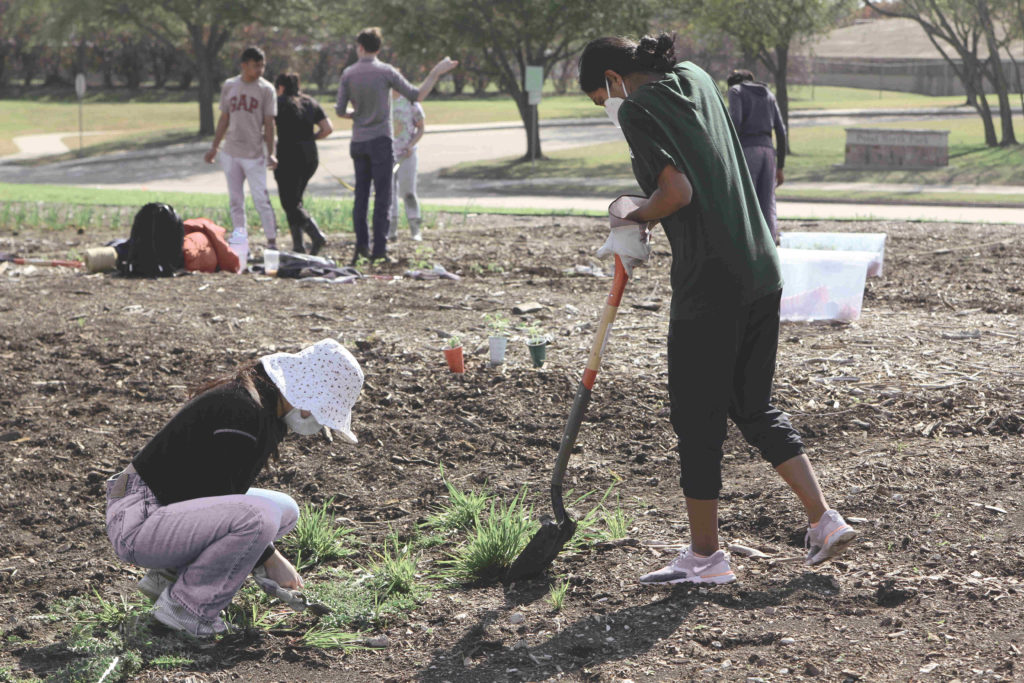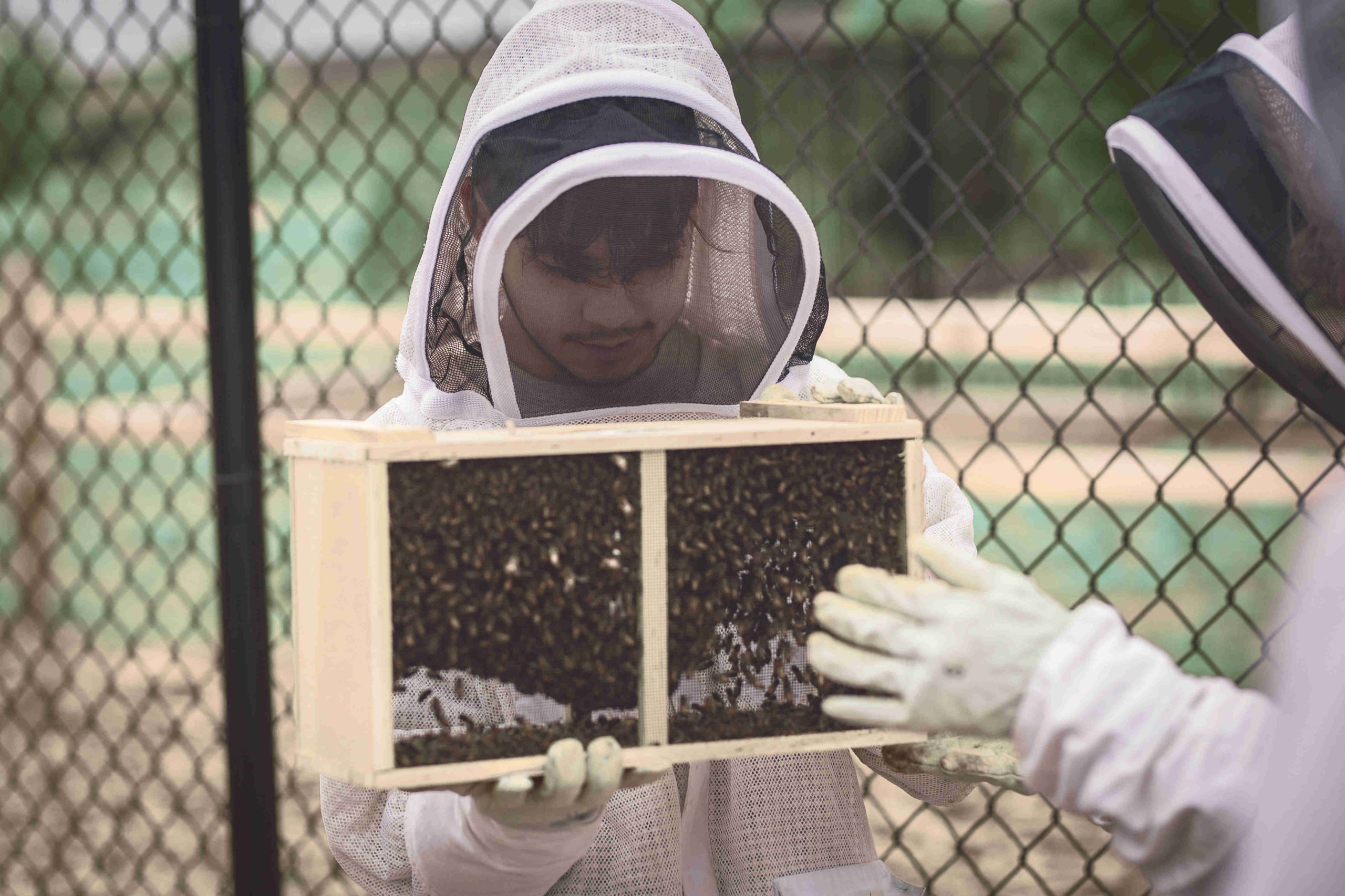In the face of global warming, ozone depletion and rampant deforestation, UTD’s Eco Hub, a project of the Office of Sustainability managed by Sustainability Coordinator Avery McKitrick and student employees, adopts sustainable practices to support future generations.
Research from the U.S. News and World Report shows that the best time to instill sustainable habits in people is during university, as students who adopt environmentally-friendly practices in college are more likely to maintain them for the rest of their lives. One way of getting involved in sustainability is through an on-campus farm. The Eco Hub was established in 2021 to teach students how they can better take care of the planet on an individual and community level. It is a 20,000 square foot piece of land that includes an apiary for honeybees, a farm with a variety of produce, flowers, fruits and onsite composting facilities.
Eco Hub members are currently trying to find optimal soil conditions and farming methods compatible with Richardson land. According to McKitrick, it is essential to use farming practices that maximize crop growth and soil productivity, leading to a healthy produce output.
In order to reach these desired conditions, the Eco Hub experimented with cover cropping and nitrogen fixation in fall 2022. Strategies including using cover crops and organic fertilizers like MicroLife to minimize soil compaction and erosion.

“We planted a variety of different cover crops, and we experimented with four different combinations of cover crops,” McKitrick said. “Each seed combination had one nitrogen fixer and one ground breaker. The idea behind that was to figure out which of those cover crops worked best in our soil.”
Most of the produce that is harvested is donated to the Comet Cupboard food pantry for students in need. Food is harvested during work days, then labeled and packaged with compostable bags and delivered to the Comet Cupboard the following week.
“We try to plant varieties that are recognizable because what we donate to the Comet Cupboard might not come with a label,” McKitrick said. “People might not know how to use something that they don’t recognize from a grocery store. So we try to keep the varieties really basic, really easy to understand.”
In an attempt to be more efficient and sustainable, members are also trying to establish a greenhouse.
“We are in the process of making some final selections for a greenhouse,” McKitrick said. “A greenhouse would be an excellent addition to the Eco Hub because we would be able to use our own vegetable seeds. Vegetable transplants are very expensive, and it’s more cost effective for us to grow them ourselves. So we’re really excited about the idea of getting a greenhouse.”
Moreover, there are also plans to diversify the fruit trees to provide more options for people who utilize the Comet Cupboard.
“Another future project that’s planned is expanding our orchard by planting more fruit trees,” McKitrick said. “So right now we have three peach trees, all of different varieties, planted in our orchard. We’d love to expand in November of this year to add three plum trees.”
The Eco Hub also contains an apiary, which nurtures the local honeybee population and harvests honey. Both students and staff participate in the apiary through classes taught by Professor of Instruction Scott Rippel.
“It’s been a great synergistic interaction between the bees and the community garden and the Eco Hub representatives and FM sustainability,” Rippel said. “It’s been a phenomenal partnership.”
Rippel and students will be building, painting and installing more beehives on April 17 and 18. Bees will be presented to the queen bee on April 20 and on Earth Day.
Future initiatives that Rippel and his team are planning include collecting, harvesting and selling honey, creating a robotic system to analyze pollen from the bees and establishing a Mason bee habitat or a native bee hotel.
“We’re going to be looking at collecting honey over the summer for the students to harvest and sell, to use that money to further community projects and student sponsored projects,” Rippel said. “[I would like to analyze] where the bees are going and which pollen sources they are going to. I would like to set up a nesting site for native bees, the 3,999 species of solitary bees that don’t live in a beehive. I’d like to set up a place where native bees can go and complete their life cycles.”
Work day tasks depend on the needs of the Eco Hub, including pulling weeds, installing mulch, planting produce, preparing for upcoming harvest seasons and composting. Interested students can can sign up for workdays on Engage UTD.
“[The Eco Hub] has come an incredible distance from when it first started,” McKitrick said. “We’ve donated a very significant amount of produce to the Comet Cupboard. We continue to increase that amount each year. We’re really proud that we have the space to do this project and the opportunity to involve students in this project because it continues to grow and improve each year and we expect that trend to continue as the Eco Hub continues.”

Leave a Reply